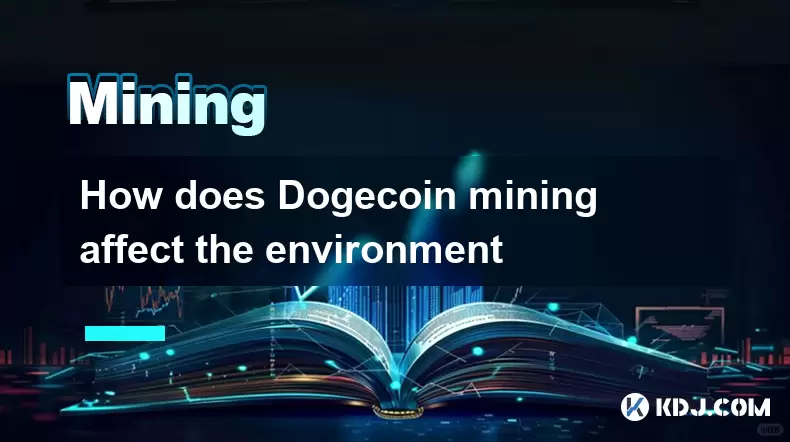-
 bitcoin
bitcoin $87959.907984 USD
1.34% -
 ethereum
ethereum $2920.497338 USD
3.04% -
 tether
tether $0.999775 USD
0.00% -
 xrp
xrp $2.237324 USD
8.12% -
 bnb
bnb $860.243768 USD
0.90% -
 solana
solana $138.089498 USD
5.43% -
 usd-coin
usd-coin $0.999807 USD
0.01% -
 tron
tron $0.272801 USD
-1.53% -
 dogecoin
dogecoin $0.150904 USD
2.96% -
 cardano
cardano $0.421635 USD
1.97% -
 hyperliquid
hyperliquid $32.152445 USD
2.23% -
 bitcoin-cash
bitcoin-cash $533.301069 USD
-1.94% -
 chainlink
chainlink $12.953417 USD
2.68% -
 unus-sed-leo
unus-sed-leo $9.535951 USD
0.73% -
 zcash
zcash $521.483386 USD
-2.87%
How does Bitcoincoin mining affect the environment
Dogecoin mining consumes significant energy and generates e-waste, but using renewable energy and sustainable practices can reduce its environmental impact.
Jul 16, 2025 at 04:35 am

Understanding the Environmental Impact of Dogecoin Mining
Dogecoin mining, like other proof-of-work cryptocurrencies, involves solving complex mathematical puzzles to validate transactions and secure the network. This process demands significant computing power, which in turn requires a substantial amount of electricity. The environmental implications stem primarily from the energy consumption associated with mining operations.
Mining rigs typically consist of powerful GPUs or ASICs (Application-Specific Integrated Circuits), both of which draw considerable electrical power during operation. The more miners participating in the network, the higher the overall energy demand becomes due to increased hashrate competition. As a result, large-scale mining farms contribute to carbon emissions, especially when the electricity they use comes from non-renewable sources such as coal or natural gas.
The Role of Energy Sources in Mining Sustainability
The type of energy used in Dogecoin mining plays a crucial role in determining its environmental impact. In regions where electricity is generated from fossil fuels, the carbon footprint of mining increases significantly. Conversely, if miners utilize renewable energy sources like solar, wind, or hydroelectric power, the ecological consequences are considerably reduced.
Some mining operations have started relocating to areas with abundant renewable resources to minimize their environmental effects. For example, countries with surplus hydroelectric power, such as Canada or Norway, are becoming attractive locations for eco-conscious miners. However, this shift is not yet widespread, and many mining farms still rely on traditional, carbon-intensive energy grids.
Hardware Consumption and Electronic Waste
Another often-overlooked aspect of Dogecoin mining's environmental impact is the generation of electronic waste. Mining hardware, particularly GPUs and ASICs, has a limited lifespan due to continuous usage and rapid technological advancements. As newer, more efficient models are released, older devices become obsolete and are discarded, contributing to growing e-waste problems.
Improper disposal of mining hardware can lead to the release of harmful substances into the environment, including heavy metals and toxic chemicals. To mitigate this issue, some companies are exploring recycling initiatives and sustainable manufacturing practices. Still, without proper regulation and infrastructure, e-waste remains a serious concern linked to cryptocurrency mining.
Comparing Dogecoin to Other Cryptocurrencies
When evaluating the environmental impact of Dogecoin, it’s important to compare it with other major cryptocurrencies like Bitcoin and Ethereum. While Dogecoin uses a similar proof-of-work mechanism, its block time is faster (approximately one minute), which theoretically allows for quicker transaction confirmations but also results in higher energy throughput over time.
Unlike Bitcoin, which has a capped supply, Dogecoin has an unlimited supply, meaning mining will continue indefinitely. This perpetual mining activity could exacerbate long-term environmental concerns compared to coins with finite supplies. Additionally, Dogecoin does not have plans to transition to a less energy-intensive consensus model like Ethereum’s recent shift to proof-of-stake.
Community Awareness and Responsible Mining Practices
As awareness of environmental issues grows, the Dogecoin community and broader crypto space are beginning to address sustainability concerns. Some miners are voluntarily adopting green energy solutions, while others support carbon offset programs to balance out their emissions.
Educational efforts within the community aim to promote energy-efficient mining setups, optimal cooling systems, and responsible hardware recycling. Furthermore, developers and enthusiasts are discussing potential upgrades to the Dogecoin protocol that may reduce its environmental footprint, though no concrete changes have been implemented so far.
Frequently Asked Questions (FAQ)
- Is Dogecoin mining illegal?Dogecoin mining is legal in most countries, although regulations vary by region. Some jurisdictions may impose taxes on mining income or restrict the use of certain energy sources for mining activities.
Can I mine Dogecoin with a regular computer?Technically, yes, but mining with a standard desktop CPU is highly inefficient. Modern Dogecoin mining requires specialized hardware such as GPUs or ASICs to be competitive and profitable.
How much electricity does Dogecoin mining consume daily?Estimates suggest that individual mining rigs can consume between 1,000 to 2,500 kWh per month, depending on the hardware efficiency and mining difficulty. Large-scale operations can use significantly more.
Are there any green alternatives to traditional Dogecoin mining?While Dogecoin itself hasn't adopted alternative consensus mechanisms, miners can opt for renewable energy sources or participate in green mining pools that prioritize sustainability. Disclaimer:info@kdj.com
The information provided is not trading advice. kdj.com does not assume any responsibility for any investments made based on the information provided in this article. Cryptocurrencies are highly volatile and it is highly recommended that you invest with caution after thorough research!
If you believe that the content used on this website infringes your copyright, please contact us immediately (info@kdj.com) and we will delete it promptly.
- Bitcoin’s Wild Ride: Crypto Market Faces Price Drop Amidst Extreme Fear and Macro Headwinds
- 2026-02-02 12:30:01
- UAE Investor Secures Major Stake in Trump-Linked Crypto Firm Amidst Shifting Geopolitical Tides
- 2026-02-02 07:10:01
- Pepe Meme Coin: Navigating the Hype, Price Predictions, and Future Outlook in 2026 and Beyond
- 2026-02-02 07:05:01
- Blockchain Gaming's Quiet Revolution: Unpacking Latest Trends and Industry Insights Amidst Market Shifts
- 2026-02-02 06:30:01
- IPO Genie, Tokenization, and YouTubers: The Big Apple's Next Big Bet on Democratized Wealth
- 2026-02-02 06:40:02
- Aptos in a Bind: Downtrend Deepens, But a Brief Relief Bounce Looms Before the Next Plunge
- 2026-02-02 07:00:01
Related knowledge

How to Spot a Cloud Mining Scam? (Red Flags to Watch For)
Feb 02,2026 at 08:20am
Unrealistic Return Promises1. Platforms advertising guaranteed daily returns above 1–2% without disclosing underlying hardware, electricity costs, or ...

How to Earn Passive Income with DePIN Mining? (New Trend 2026)
Feb 01,2026 at 12:40pm
Understanding DePIN Mining Mechanics1. DePIN mining relies on real-world infrastructure participation rather than computational hashing. Users deploy ...

How to Mine Vertcoin (VTC) on Your Gaming Desktop? (One-Click Miner)
Feb 02,2026 at 03:39am
Understanding Vertcoin's Mining Algorithm1. Vertcoin uses the Verthash algorithm, which is intentionally memory-hard and designed to resist ASIC domin...

How to Set Up a Quiet Mining Rig at Home? (Noise Reduction)
Feb 01,2026 at 11:00pm
Acoustic Enclosure Design1. Use rigid, dense materials such as MDF or acoustic-grade plywood for the enclosure walls to block mid-to-high frequency no...

How to Choose a Mining Pool with Lowest Fees? (Fee Comparison)
Feb 02,2026 at 02:39am
Understanding Mining Pool Fee Structures1. Pool operators charge fees to cover infrastructure, maintenance, and administrative costs. These fees manif...

How to Mine Bitcoin on Mac (M1/M2/M3)? (Software Tutorial)
Feb 01,2026 at 07:19pm
Understanding Bitcoin Mining on Apple Silicon1. Bitcoin mining relies on solving cryptographic puzzles using computational power, and Apple’s M1, M2, ...

How to Spot a Cloud Mining Scam? (Red Flags to Watch For)
Feb 02,2026 at 08:20am
Unrealistic Return Promises1. Platforms advertising guaranteed daily returns above 1–2% without disclosing underlying hardware, electricity costs, or ...

How to Earn Passive Income with DePIN Mining? (New Trend 2026)
Feb 01,2026 at 12:40pm
Understanding DePIN Mining Mechanics1. DePIN mining relies on real-world infrastructure participation rather than computational hashing. Users deploy ...

How to Mine Vertcoin (VTC) on Your Gaming Desktop? (One-Click Miner)
Feb 02,2026 at 03:39am
Understanding Vertcoin's Mining Algorithm1. Vertcoin uses the Verthash algorithm, which is intentionally memory-hard and designed to resist ASIC domin...

How to Set Up a Quiet Mining Rig at Home? (Noise Reduction)
Feb 01,2026 at 11:00pm
Acoustic Enclosure Design1. Use rigid, dense materials such as MDF or acoustic-grade plywood for the enclosure walls to block mid-to-high frequency no...

How to Choose a Mining Pool with Lowest Fees? (Fee Comparison)
Feb 02,2026 at 02:39am
Understanding Mining Pool Fee Structures1. Pool operators charge fees to cover infrastructure, maintenance, and administrative costs. These fees manif...

How to Mine Bitcoin on Mac (M1/M2/M3)? (Software Tutorial)
Feb 01,2026 at 07:19pm
Understanding Bitcoin Mining on Apple Silicon1. Bitcoin mining relies on solving cryptographic puzzles using computational power, and Apple’s M1, M2, ...
See all articles










































































